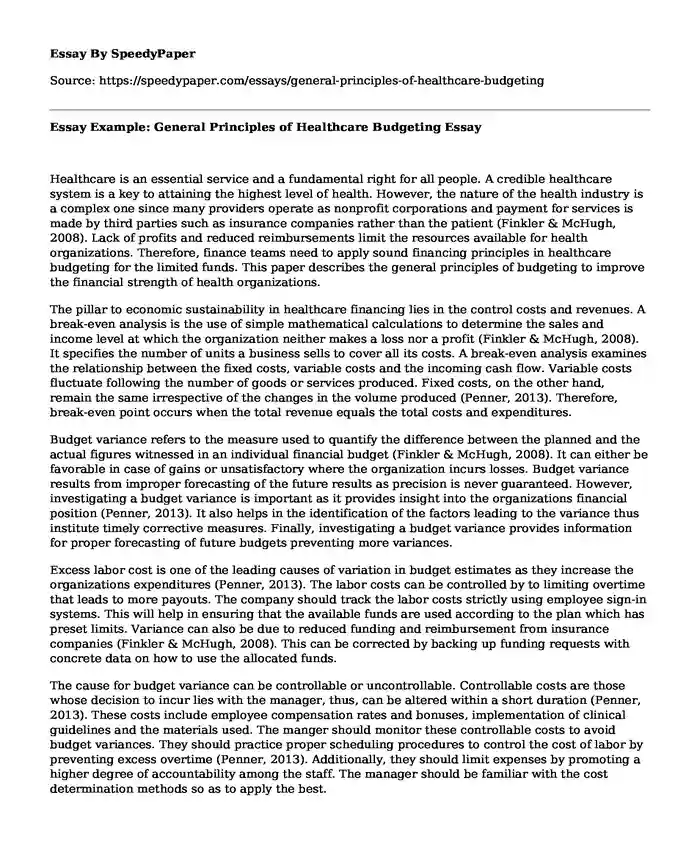
| Type of paper: | Essay |
| Categories: | Finance Healthcare Budgeting |
| Pages: | 3 |
| Wordcount: | 802 words |
Healthcare is an essential service and a fundamental right for all people. A credible healthcare system is a key to attaining the highest level of health. However, the nature of the health industry is a complex one since many providers operate as nonprofit corporations and payment for services is made by third parties such as insurance companies rather than the patient (Finkler & McHugh, 2008). Lack of profits and reduced reimbursements limit the resources available for health organizations. Therefore, finance teams need to apply sound financing principles in healthcare budgeting for the limited funds. This paper describes the general principles of budgeting to improve the financial strength of health organizations.
The pillar to economic sustainability in healthcare financing lies in the control costs and revenues. A break-even analysis is the use of simple mathematical calculations to determine the sales and income level at which the organization neither makes a loss nor a profit (Finkler & McHugh, 2008). It specifies the number of units a business sells to cover all its costs. A break-even analysis examines the relationship between the fixed costs, variable costs and the incoming cash flow. Variable costs fluctuate following the number of goods or services produced. Fixed costs, on the other hand, remain the same irrespective of the changes in the volume produced (Penner, 2013). Therefore, break-even point occurs when the total revenue equals the total costs and expenditures.
Budget variance refers to the measure used to quantify the difference between the planned and the actual figures witnessed in an individual financial budget (Finkler & McHugh, 2008). It can either be favorable in case of gains or unsatisfactory where the organization incurs losses. Budget variance results from improper forecasting of the future results as precision is never guaranteed. However, investigating a budget variance is important as it provides insight into the organizations financial position (Penner, 2013). It also helps in the identification of the factors leading to the variance thus institute timely corrective measures. Finally, investigating a budget variance provides information for proper forecasting of future budgets preventing more variances.
Excess labor cost is one of the leading causes of variation in budget estimates as they increase the organizations expenditures (Penner, 2013). The labor costs can be controlled by to limiting overtime that leads to more payouts. The company should track the labor costs strictly using employee sign-in systems. This will help in ensuring that the available funds are used according to the plan which has preset limits. Variance can also be due to reduced funding and reimbursement from insurance companies (Finkler & McHugh, 2008). This can be corrected by backing up funding requests with concrete data on how to use the allocated funds.
The cause for budget variance can be controllable or uncontrollable. Controllable costs are those whose decision to incur lies with the manager, thus, can be altered within a short duration (Penner, 2013). These costs include employee compensation rates and bonuses, implementation of clinical guidelines and the materials used. The manger should monitor these controllable costs to avoid budget variances. They should practice proper scheduling procedures to control the cost of labor by preventing excess overtime (Penner, 2013). Additionally, they should limit expenses by promoting a higher degree of accountability among the staff. The manager should be familiar with the cost determination methods so as to apply the best.
There are four primary means of cost determination. The cost-to-charge ratio (CCR) method divides the total hospital costs by the hospital charges (gross revenues) to determine the relationship between costs and prices (Finkler & McHugh, 2008). Activity based costing is a method that uses the direct and indirect costs of specific activities to settle on the price to be paid by patients. Volume based costing system allocate costs based on single-volume measures used to create products such as supervision, labor, and machine hours. Expenses in this method vary in the volume of production. Finally, per-diem approach is the cost method based on the amount of money reimbursed to employee for the various expenses that they incur for example, transport and meal charges.
In conclusion, managers in the healthcare sector needs to familiarize themselves with the basic guidelines in healthcare budgeting. They should be aware of their organizations breakeven point to establish the relationship between their revenues and costs. They should also monitor and evaluate the budget process correctly to avoid negative variances that affect the financial position of the organization. Additionally, they need to manage the controllable costs effectively to prevent unnecessary expenditures. Applying these budgeting principles would ensure that health managers realize the bottom line benefits of cost containment and process improvement for maximization of revenues and the quality of healthcare.
References
Finkler, S. & McHugh, M. (2008). Budgeting concepts for nurse managers. St. Louis, Mo: Saunders/Elsevier.
Penner, S. (2013). Economics and financial management for nurses and nurse leaders. New York: Springer Publishing Company, LLC.
Cite this page
Essay Example: General Principles of Healthcare Budgeting. (2019, Aug 30). Retrieved from https://speedypaper.com/essays/general-principles-of-healthcare-budgeting
Request Removal
If you are the original author of this essay and no longer wish to have it published on the SpeedyPaper website, please click below to request its removal:
- Essay Example on the Dental Materials Experiment
- Essay Sample on Online Reservation System in the Hospitality Industry
- Migration of Latino Groups into the United States, Essay Sample for You
- Free Essay Example on the Men's Fashion Industry
- Essay Sample Describing the Challenges Associated with Domestic Terrorism
- Free Essay Example. Build Up of America
- Assessment Tools and Diagnostic Tests in Adults and Children - Essay Sample
Popular categories




